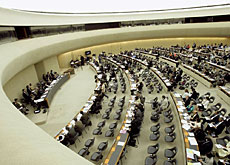ICRC says security is worsening in Darfur

Increased "banditry and criminality" in Sudan's Darfur region are preventing aid from reaching those in need, says the International Committee of the Red Cross.
Jakob Kellenberger, president of the Swiss-run organisation, said on Friday that the deteriorating security situation was giving rise to major humanitarian concerns.
“We have huge unchanged humanitarian needs on one side and on the other side we have a deteriorating security situation which makes access to people more difficult all the time,” he said.
“So the gap is widening between the needs and the possibilities of access. That is a very serious concern.”
Kellenberger was speaking in Geneva after returning from a five-day visit to the country – his third since 2004 – to assess the humanitarian and security situation. Sudan is the ICRC’s largest operation at a cost of about SFr73 million ($59 million).
During his visit Kellenberger travelled to some of the worst-affected areas, including Gereida, Nyala and Al Fashir in North and South Darfur. He also went to Juba in southern Sudan.
Experts say around 200,000 people have been killed and about 2.5 million others driven from their homes in Darfur since 2003, when rebels took up arms against the government.
“Serious measures”
Kellenberger held meetings with the Sudanese government and armed groups and said he had impressed upon them the need to respect international humanitarian law and to take “serious measures” to protect civilians and aid workers.
One ICRC staff member was killed in Darfur last summer and several have been attacked. Kellenberger said the number of security incidents had increased considerably over the past 12 months.
He explained that while the ICRC was widely accepted by all parties as an independent actor, this did not guarantee protection because of the complex and volatile situation on the ground due to the presence of 20 armed groups and tribal fighting.
“It is an environment in certain parts that is characterised by banditry and criminality, and that makes access extremely difficult,” he said.
“So even for us – probably the main actor in the field – the access possibilities have considerably decreased in recent times.”
Displaced
Kellenberger recalled that the ICRC had taken over the running of a camp in Gereida for 120,000 internally displaced people, including 18,500 children under the age of five. He said an extra SFr30 million was needed to manage the camp.
Non-governmental organisations pulled out in December after what he described as a “shocking attack” during which an international aid worker was raped.
Kellenberger said the ICRC had a long-standing commitment to the people in Darfur, but he warned conflict parties not to take the organisation’s presence on the ground for granted.
“It is imperative that there is much less talk and much more action to improve the security environment in Darfur. There are clear responsibilities in that respect for all the actors – the government and armed groups.”
swissinfo, Adam Beaumont in Geneva

More
International Committee of the Red Cross
The ICRC has been active in Sudan since 1984, owing to the civil war in the south, and in Darfur since 2004.
The ICRC has 160 expatriate staff and over 1,800 Sudanese staff in all three Darfur states, southern Sudan and Khartoum.
According to the ICRC, escalating fighting has driven people to remoter areas, making harder for staff to reach them.
The Geneva-based organisation has been focusing its efforts on the rural areas rather than the camps but fears its response will fall short of the needs of the people unless safe access can be guaranteed.
The Sudanese government has so far resisted pressure to authorise deployment of thousands of United Nations peacekeepers to support a 7,000-strong African Union mission in Darfur.

In compliance with the JTI standards
More: SWI swissinfo.ch certified by the Journalism Trust Initiative










You can find an overview of ongoing debates with our journalists here . Please join us!
If you want to start a conversation about a topic raised in this article or want to report factual errors, email us at english@swissinfo.ch.